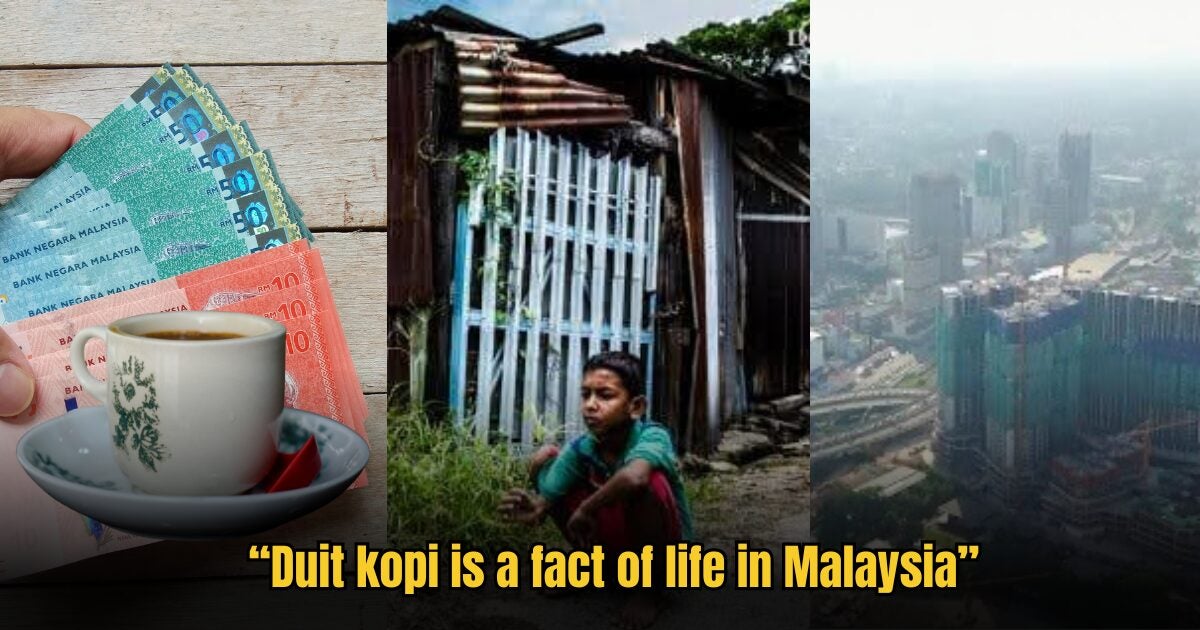Disclaimer: In Real Life is a platform for everyday people to share their experiences and voices. All articles are personal stories and do not necessarily echo In Real Life’s sentiments.

This opinion piece shares how the culture of ‘duit kopi’ is so ingrained in Malaysia, that it allows people like Najib to thrive – sparking the question: What can we do to change?
Bribery is all part of the Malaysian way of overcoming obstacles.
It starts from young – when you’re stopped at a roadblock with an invalid license. Or when your driving instructor implies that he will fail you unless you give him a little something “to bribe the JPJ officers” and help him pass you.
We have a cute little name for it too: “Duit kopi” (coffee money). It’s pretty much a fact of life here in Malaysia.
There’s a saying that fines just mean that the crime is accessible to the rich. Like how those who can afford to pay parking summonses can park anywhere they like in KL.
In the same way, bribery makes crimes accessible to the rich. Or at least to those who can afford the price.
People naturally tend to focus on the little corruption cases: someone paying RM500 to a policeman because they were drunk driving perhaps, or maybe even the small business that illegally employs foreign workers paying a bribe of RM25,000 to keep the authorities quiet.
But crimes get bigger as you go up the socioeconomic hierarchy
And corruption is no exception to this. As the crimes get bigger, so do the repercussions.
An example of corruption that not many have heard of is the case of Malaysian Anti-Corruption Commission’s chief Datuk Seri Azam Baki.
He was discovered to own millions in publicly traded stock – civil servants are not allowed to own shares totalling more than RM100,000, according to s23 Service Circular 3/2000.
In his defense, Azam said, “I don’t owe anyone any explanation.” This is a presumptuous statement, because government servants are accountable to the people of Malaysia.
The chairperson of the Anti-Corruption Advisory Board, Abu Zahar Ujang backed him up, “explaining” during a special press conference that the shares were purchased by Azam’s younger brother in his name.
Malaysians have seen this event as mere confirmation of the suspicion that corruption extends far above what the average Malaysian will be able to see.
This isn’t even the first time that MACC has had its reputation called into question. MACC is apparently jokingly referred to as “mana ada corruption case”, especially when it comes to VVIPs.
The 1MDB scandal is just a bigger version of what plays out in Malaysian politics.
At the time of the controversy, shock reverberated through the nation and it was enough to topple Umno’s stranglehold on the country’s politics.
But now?
There are some who believe that Najib might once again regain a foothold within the political sphere. And not just involvement in politics, but maybe even the position of Prime Minister (again).
This comes following the recent news of his reduction in jail term from 12 years to 6 years, and a reduction in his fine from RM 210 million to RM 50 million.
Despite everything he’s done to the country, Najib still enjoys some measure of popularity.
And that is how normalized corruption is in Malaysia.
Corruption is not only evidence of moral failure in public servants, but also a willingness in the leaders of our country to shortchange us.
Corruption leads to poverty.
This is because it significantly restrains the growth and development of a country.
These effects happen through political instability in the country as well. Political instability is a deterrent for foreign investors and we see that happening even now.
A study has shown how corruption leads to poverty through political instability, which apparently accounts for 53% of the reduction in growth of a country.
Corruption also leads to wealth inequality. It’s not the palms of the peasants that will be greased magnificently, it’s those of the people who are higher up, because they are the ones who make the important decisions.
And corruption leads to public services and projects that do not benefit the people – either through services of inferior quality, or those that are not useful to the majority.
Either way, the Rakyat bears the brunt of it.
We suffer from the long waiting period of the KTM train, the underdeveloped infrastructure of East Malaysia, the floods during monsoons and water rationing during droughts.
And handshakes go on to hide banknotes.
This article was first published in January 2022 and has been edited with recent news updates for the 2024 political climate.
What do you think?
Send an email to ym.efillaerni@olleh and you may be featured on In Real Life Malaysia.
More from Real People
‘A RM100 fee cost a company 5 years of revenue’ shares M’sian
This story is about a Malaysian who learned that bureaucracy can be defeated simply by not arguing with it.A billing …
‘I quiet-quit, upskilled, and tripled my salary,’ shares M’sian engineer
This story is about a Malaysian who learned that loyalty without leverage leads nowhere in the corporate world.After years of …
‘I did everything right, and it still wasn’t enough’ shares M’sian graduate
This story is about a Malaysian graduate navigating big dreams in a job market where a degree no longer guarantees …















